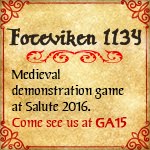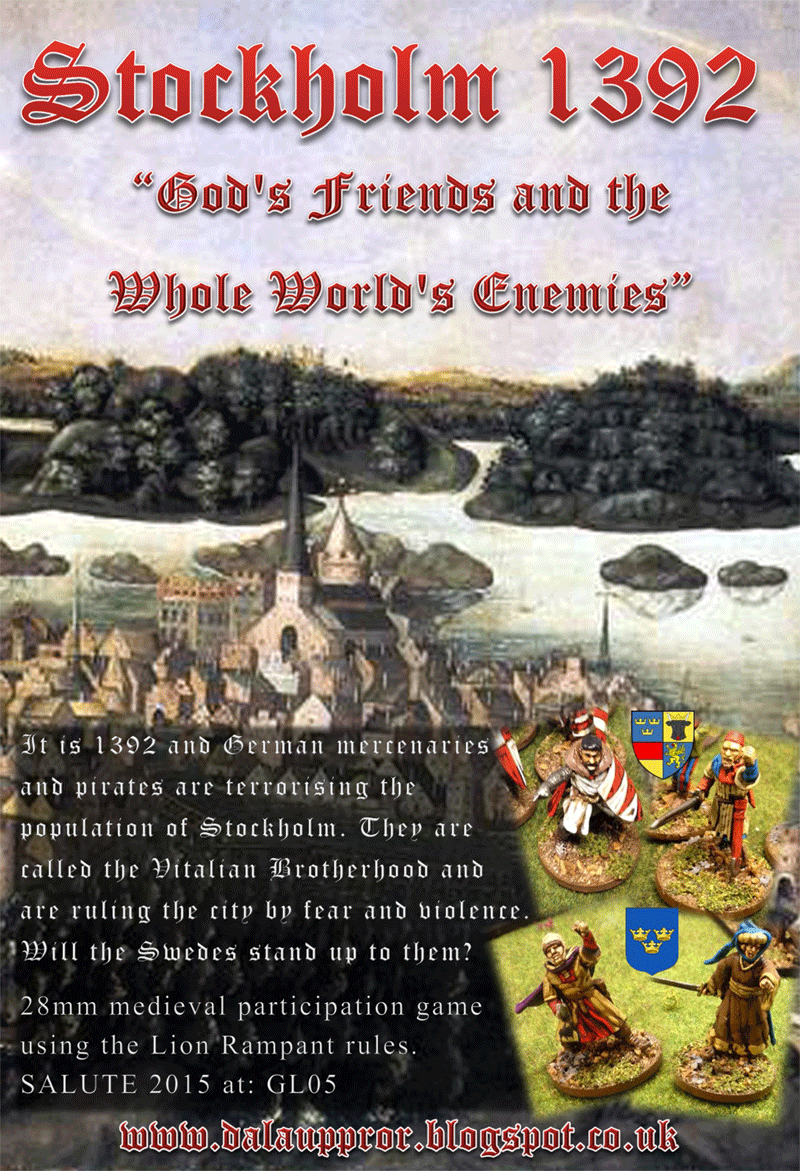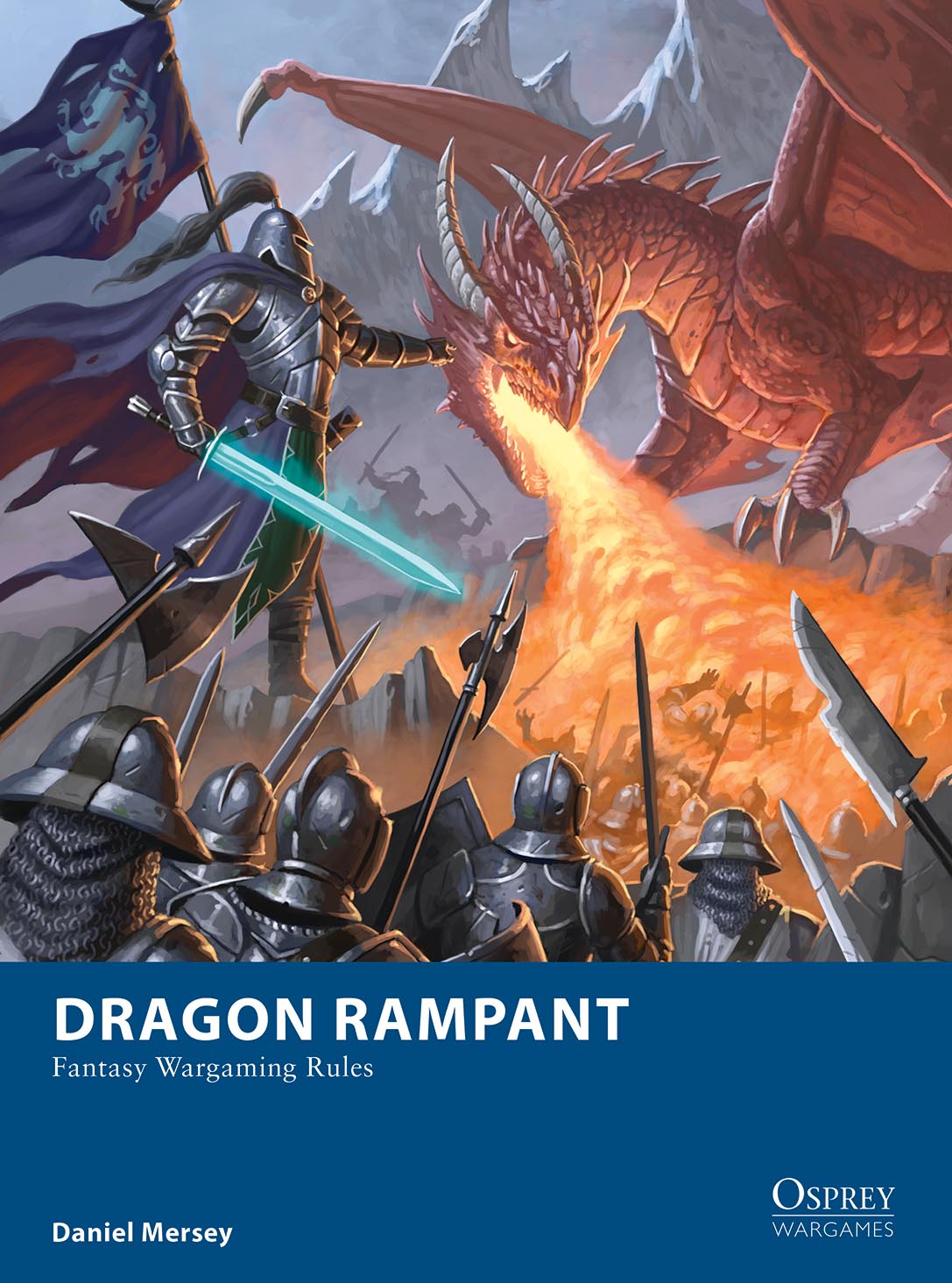Let me introduce one of the most colorfull characters in the 15th centery Swedish history the Swedish Archbishop Jöns Bengtsson from the House of Oxenstierna.
The Archbishop mini are a converted Perry WotR mini, the foot minis are Perry plastics and the casulty/kneeing mini are from the Perry HYW range. You find some pictures of then unpainted viginet here The conversion of the Archbishop was inspired by Painterman´s Archbishop of Canterburry viginet back in 2010...took me some years to get mins done...
The banner´s you seen before, they are handpainted linnen banners. The right banner are the Archbishops personal banner, a combination of the Coat of Arms of the house: Oxenstierna and the Archbishop Coat of Arms. The left one are the Banner of Saint Erik, a banner that was keept in the Archbishop´s Cathedral of Uppsala.
As the Swedish King Karl Knutsson (Bonde), to escape from money troubles, increased taxes and confiscated church property, dissatisfaction spread among clergy and people, and Bengtsson placed himself at the head of the opposition in 1457.
Entering his cathedral, he laid aside his pontifical insignia, took up helmet, breastplate, and sword, and announced his intention not to resume his pontifical robes until King Karl should be banished from the country. After the Battle of Älgsundet in february 1457, the King was forced to yield and fled to Germany.
Thereupon Christian I of Denmark was formally recognized King of Sweden, and crowned at Stockholm by the Archbishop.
General discontent soon followed, especially when Christian, on becoming heir to his uncle, Duke Adolph of Holstein, found himself in great financial straits. To meet his obligations, he levied enormous taxes, even in Sweden, without exempting ecclesiastics, religious foundations, or the moneys collected by papal mandate to defray the expenses of a crusade against the Turks.
During a temporary absence of Christian I in Finland, the archbishop held the regency of Sweden; seeing the people in revolt against him and the heavy imposts, he took up their cause and suspended the collection of taxes. The king showed his displeasure by arresting the archbishop and sending him to Denmark.
A revolution broke out afresh in Sweden: Karl VIII was recalled to the throne, and Christian I, to recover the country, became reconciled with his prisoner. The Archbishop went at once to Sweden, where he roused the people against Karl VIII, whom he excommunicated.
The archbishop succeeded finally in bringing about Karls' abdication, and the recognition of Christian I once more as King of Sweden. In reality, however, the archbishop held the effective reins of power and administered affairs as though he were the actual sovereign. He was unable to sustain this role. Discontented factions combined against him and, in 1466, elected Erik Axelsson Tott as regent, whereupon the Archbishop was compelled to retire.
Dissensions continued, and the king of the Swedish party, Karl VIII, once more took the place of the king who represented the union of the three countries. The archbishop found an asylum with his friend Magnus Gren, on the island of Öland. Here he died at Borgholm on 15 December 1467, "poor and exiled, regretted by no one, hated by many, and feared by all".
The key to the political activity of Bengtsson is to be found in the ambition that was a part of his character — ambition for his family and his country. There was a strong antagonism between the great Oxenstjerna family, to which the archbishop belonged, and the Bonde family, of which the king, supported by the national party, was member.
Moreover, the archbishop was aware that the nobility and the leading men of Sweden, before the Union of Kalmar, had in general failed to respect the clergy and the property of the Church. In a union of Sweden with Denmark and Norway, he foresaw a limitation of the power of the Swedish nobles; in his character of archbishop, it was clear to him that such curtailment would be a safeguard to the temporalities of the Church.
All for now, thanks for reading !































Great work on the archbishop and the flags looks stunning as always :)
ReplyDeleteExcellent conversion. The bishop looks awesome and the idea with the removable flags is excellent.
ReplyDeleteFantastic. Great selection of miniatures and bits - the kneeling figure in particular helps set the scene. Very nice painting too and great little details like the red crosses on the cloak.
ReplyDeleteWhat a career this guy had. Beautiful painting Micke, love all the details!
ReplyDeleteSimply superb!
ReplyDeleteExcellent work on the minis! And nice background info on the Archbishop. Sounds like an interesting time in Swedish history indeed.
ReplyDeleteStunning work Michael! The modelling, the painting and the composition of the base are superb as always.
ReplyDeleteTruly a worthy center piece to the army.
Lovely piece... very well done!
ReplyDeleteOh that's a really nice group. Nice paint job too
ReplyDeleteAtmospheric !
ReplyDeleteDamn cool!
ReplyDeleteWonderful work Michael! Flags are incredible!
ReplyDeleteThat is absolutely superb! What a triumph Michael.
ReplyDeleteReally nice little diorama set there! Lovely work as always.
ReplyDeleteNice miniature and history lesson.
ReplyDeleteVery nice work and the banners are great!
ReplyDeleteChristopher
lovely painting with good colors,
ReplyDeletegreat miniatures....marvelous!
Great painting and killer banners! I do like that they can be swapped out.
ReplyDeleteLove the history too!
Fabulous work! The bishop is real eyecandy.
ReplyDeleteMarvelous
ReplyDeleteTop job Michael!!!
ReplyDeleteFantastic work!!! A wonderful character.
ReplyDeleteI´m very honoured by all you nice comments ! Thank you very much mateys !!!
ReplyDeleteBest regards Michael
Wow! Excellent figures and stand. I saw the conversion a few minutes ago. It came together beautifully.
ReplyDeleteHow did I miss this post. Fantastic painting on the figures and banners Michael.
ReplyDeleteCheers,
Pat.